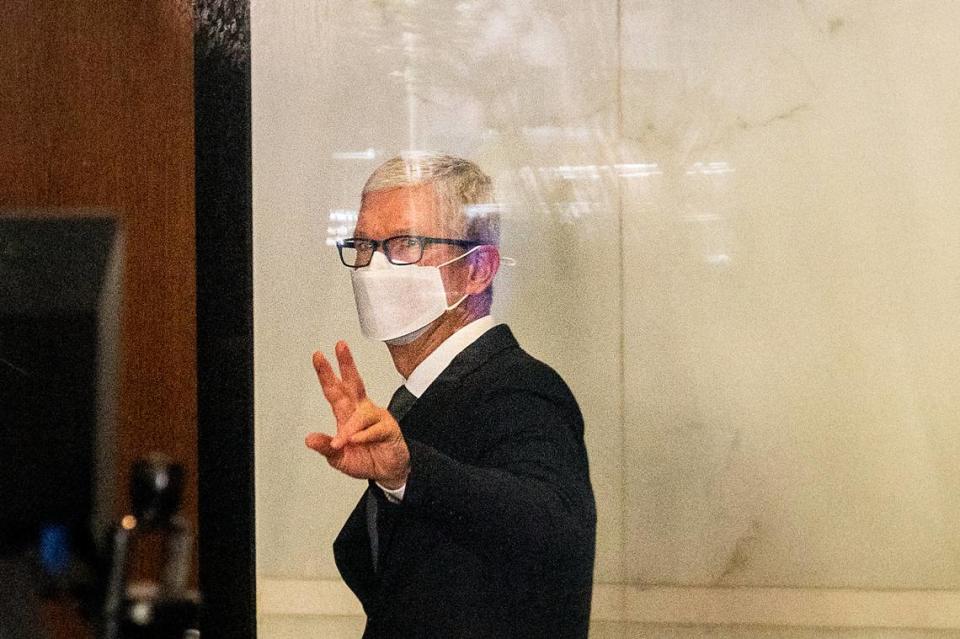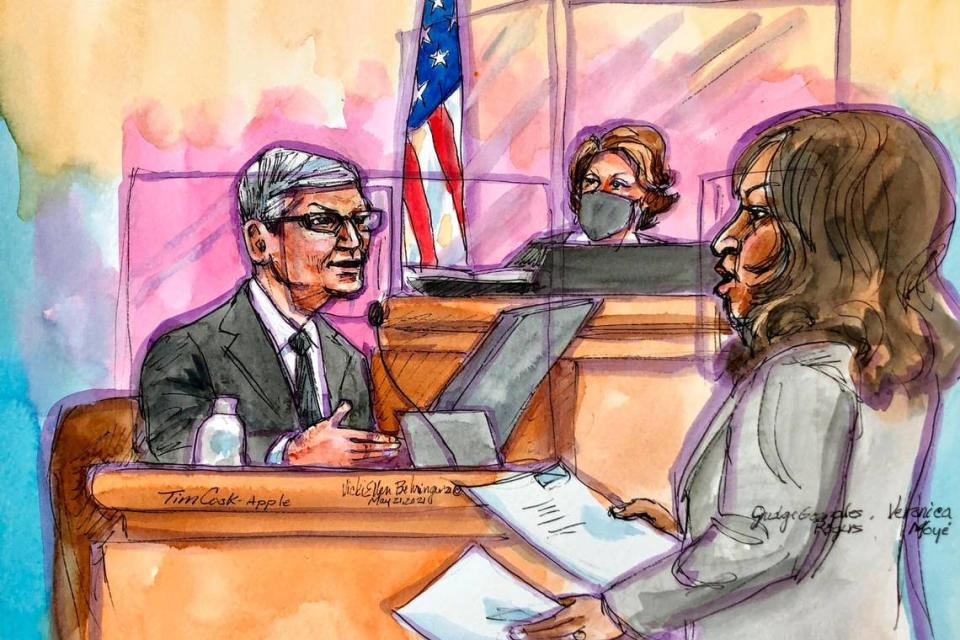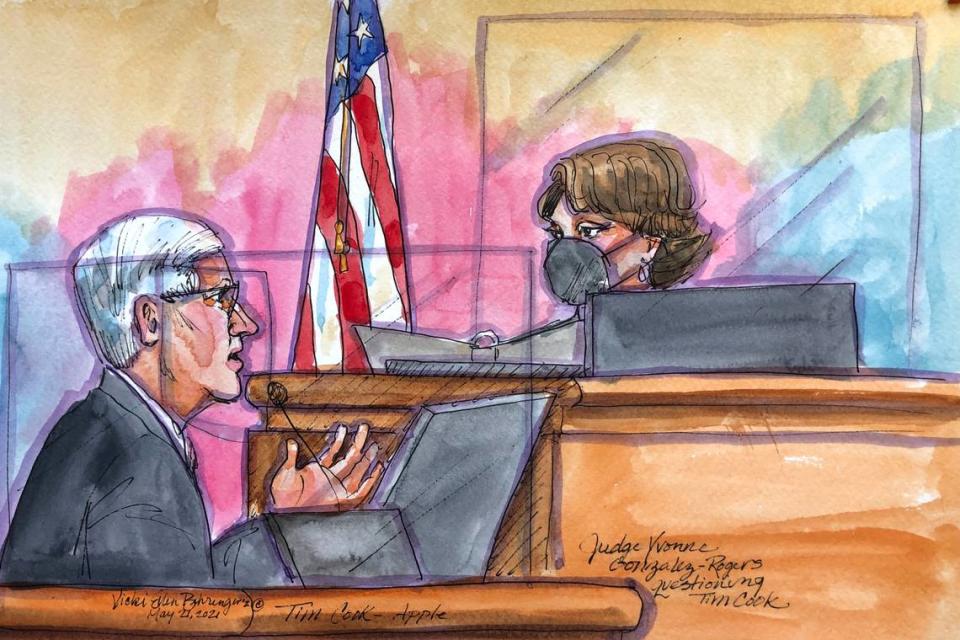Apple CEO Tim Cook testified in the Epic v. Apple trial. Here are 4 key takeaways.
- Oops!Something went wrong.Please try again later.
For the first time as CEO of Apple, Tim Cook entered into a courtroom on Friday to defend his company’s business model.
Cook’s testimony came on the last day of the much-watched Epic Games vs. Apple lawsuit, an antitrust case that could forever change how Apple’s App Store operates.
The lawsuit dates back to August when Cary-based Epic Games, the developer of the popular Fortnite video game, inserted its own payment system within its iPhone app. It was an effort to circumvent Apple’s 30% mandatory fee on in-app purchases, but it resulted in Fortnite being kicked out of the App Store.
Epic’s contention remains that apps should be able to provide their own payment systems and be able to avoid the App Store altogether. In his own time on the witness stand at the beginning of the trial earlier this month, Epic Games CEO Tim Sweeney said Apple’s tight control stifles his North Carolina-based company’s ambitions and growth.
Apple believes opening up the App Store will undermine the security on its phones.
Cook, taking the stand for nearly four hours on Friday, repeated that contention, saying Apple’s policies in the App Store are about “safety, security and privacy” rather than maintaining some form of monopoly.
“[Privacy] is a core part of our design, not an add-on. In the case of the App Store,” he said, adding Apple rejects 40% of apps, “we review every app that goes on the store because there are malicious things that can occur.”
As a result, iPhones are more secure than other smartphones on the market, he said.

As the trial heads into the end stretch, here are some of the biggest takeaways from Cook’s testimony:
Gamers disproportionately affected
The most interesting part of Cook’s day on the stand may have come toward the very end.
Before breaking into a closed session, Judge Yvonne Gonzalez Rogers, who is overseeing the bench trial, spent around 10 minutes lobbing direct questions at Cook about Apple’s business model.
The line of questions, which may give an insight into Gonzalez Rogers’ thought process, raised concerns about why developers aren’t allowed to communicate cheaper purchasing options outside of the App Store to customers. Epic Games, for example, can’t tell iPhone users that V-Bucks, the game’s currency, could be found for a cheaper price on its website.
“What is the problem with allowing users to have choice, especially with gaming content, to find a cheaper option for content?” she asked Cook. “If they wanted to get cheaper V-Bucks, and they don’t know that they have got that option, what is the problem with them giving that option?”
Cook responded that Apple needs to “get a return” on the “intellectual property” it provides to developers.
This, however, is resulting in the gaming industry “generating a disproportionate amount of money relative to the IP you have given them, and everyone else,” Gonzalez Rogers said.
“In effect,” she added, “it’s almost as if they’re subsidizing everyone else,” like free banking apps from Wells Fargo or Bank of America that don’t have in-app purchases.

Cook agreed games create the most revenue for the App Store. However, the free apps, which account for 85% of the App Store, create the huge audience on the iPhones that gaming companies benefit from, he noted.
“I understand the notion that somehow Apple brings the customer to the games. But after that first interaction, the developers of the games are keeping their customers. Apple’s just profiting off that,” Gonzalez Rogers said.
She suggested that there could be other ways Apple could monetize the App Store than the 30% fee. Cook said Apple believes that’s the best way to repay the benefits it provides developers.
Gonzalez Rogers also cited a survey that said 39% of app developers are dissatisfied with the App Store. “It doesn’t seem to me you feel pressure or competition to actually ... address the concerns of developers,” she said.
Gonzalez Rogers also said she was skeptical of the reasoning behind Apple’s decision last November to lower App Store fees from 30% to 15% for small businesses.
“At least from what I’ve seen thus far,” she said, “that really wasn’t the result of competition. That seemed to be a result of the pressure that you’re feeling from investigations, from lawsuits, not competition.”
Cook responded, “It was the result of feeling like we should do something for COVID.
“Of course we had those things — the lawsuits and all the rest of the stuff — in the back of my head,” he said. “But the thing that triggered it was we were very worried about small businesses.”

Cook sees fierce competition, not a monopoly
Cook spent the opening parts of his testimony attempting to highlight what he views as a fierce amount of competition for Apple’s iPhone and App Store.
“It is fiercely competitive in mobile,” Cook said, noting it competes against companies like Google, Samsung, Huawei and others in the smart phone market.
He put its worldwide market share in the smartphone market at 15%, while it is in the “high-30s,” in the U.S. The app stores on those other phones, he added, are direct competitors. Cook included video game consoles, like the PlayStation and Xbox, as direct competitors as well, though that has been argued throughout the trial.
Cook said competition has dictated its App Store policies, as he believes one of the main reasons customers choose Apple products is because of the company’s commitment to privacy.

He noted those policies have resulted in malware rates on iPhones being around 1% to 2%, while Android phones, which allow users to download apps outside of its app store, have rates closer to 30% to 40%. “It is quite the difference,” he told Gonzalez Rogers.
As for the 30% in-app purchasing fees, Cook said, those help create a financial return for the investments Apple makes into the App Store. Cook proudly highlighted that Apple spent $16.2 billion on research and development in 2019 and $18.8 billion last year.
Apple’s privacy stances in China
In response to Cook’s comments on the importance of privacy, Epic lawyers brought up Apple’s business practices in China.
In China, the company’s iCloud service, which allows users to store data from their phones, is partly managed by GCBD, a company owned by the Chinese government, because of Chinese law.
“When Apple agrees to share user data with a Chinese state entity ... that is a situation where commitment to privacy and financial interests are in conflict,” Epic counsel Gary Bornstein said.
Cook disagreed, saying it follows the rules of the countries where it has business.
“We have to comply with the laws in the jurisdictions that we operate in,” Cook replied, adding he believes Apple’s presence in China is “in the best interests of the people there.”
Epic, it should be noted, also has strong ties to China. Chinese tech firm Tencent owns around a 40% stake in Epic.
App Store profitability
A large portion of Cook’s back-and-forth with Epic lawyers centered on the profitability of the App Store.
Cook answered repeatedly that he did not know the exact profit margins of the App Store, as that was something Apple didn’t break out.
He said he “had a feel” that it was profitable.
When presented with internal documents and third-party expertise that the App Store had profit margins of around 70% to 80%, he insisted those documents weren’t taking into account how Apple actually does its financial accounting.
Cook later said he didn’t know how much Apple received from Google for making its search engine the default option on the iPhone.
Google pays around $10 billion to be the default search engine on Apple products, a fact that was unearthed by a U.S. Department of Justice antitrust investigation.
When Bornstein asked Cook if that number was correct, he replied, “I don’t know.”
Trial wraps up Monday
The trial is expected to wrap up on Monday, though it is not clear when Gonzalez Rogers’ decision in the case will be released.
She has previously said it would not likely come on Monday or the next day, The New York Times reported.
Whatever her decision is will likely be appealed to a higher court.
“I know I’m just a stepping stone for all of you,” she previously said in court.
This story was produced with financial support from a coalition of partners led by Innovate Raleigh as part of an independent journalism fellowship program. The N&O maintains full editorial control of the work. Learn more; go to bit.ly/newsinnovate.

